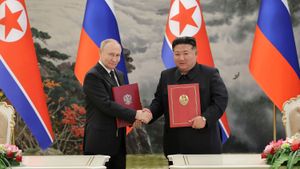India's economic aspirations to evolve as a developed nation by 2047 have gained new momentum, fueled by insights from key experts like Gita Gopinath. The First Deputy Managing Director of the International Monetary Fund (IMF) recently underlined the necessity of transforming educational frameworks and workforce skills as stepping stones to achieving this ambitious goal.
During her address at the Delhi School of Economics, Gopinath shared her observation of India's impressive growth rate, hovering around 7%. Despite this growth, she reiterated the urgent call for systemic reforms necessary to sustain such economic momentum and advance toward high-income status.
A significant portion of Gopinath's discussion revolved around the pressing need for infrastructure investment. She beckoned for increased government expenditure on public infrastructure to minimize the existing growth limitations posed by infrastructural gaps.
She emphasized the importance of implementing serious labor market reforms, outlining how outdated regulations often impede progress. Proposals to improve the Ease of Doing Business and streamline judicial processes surfaced as key areas requiring reform to catapult India's economic ambitions.
Gopinath spotlighted labor market flexibility as pivotal for India's path to development. She pointed out the importance of establishing responsive labor codes and adopting open trade policies to encourage innovation and efficient resource allocation.
Women's participation in the labor force emerged as another pressing matter during her talk. She advocated for initiatives targeting female employment, underscoring the sync between gender equality and economic success.
While discussing investments, Gopinath highlighted health care access and quality as critical areas for improvement. Enhanced health services would allow for the development of a healthier workforce, which is integral for economic productivity.
Despite acknowledging the accelerated growth of the Indian economy, Gopinath expressed concern about the stagnation of job creation rates which have lingered below 2%. This statistic points to the economic dependency on capital-intensive growth, creating challenges for sustainable job generation.
Looking toward 2030, Gopinath flagged the urgent need for creating between 60 to 148 million new jobs to cater to the rapidly changing demographics. These figures paint a vivid picture of the workforce challenges India must address as industrialization continues apace.
She did not sidestep the elephant in the room—climate change. Gopinath warned of the significant risks it poses to India's economy and emphasized the necessity of addressing these environmental concerns to avoid potential roadblocks to progress.
Gopinath's observations serve as both a wake-up call and a roadmap for India's future. Her analysis points to the pressing need for policies coupling economic growth with sustainable development to forge resilience against upcoming challenges.
Echoing the sentiments of various economists, it's apparent India urgently requires refining its economic strategy as it eyes 2047. The comprehensive approach she laid out not only hints at positioning India favorably on the global map but fosters internal growth with inclusive measures.
Her emphasis on collaboration among various stakeholders—policymakers, civil society, and the private sector—is fundamental for realizing the vision of India as a developed nation.
Gopinath also discussed the need for implementing labor codes passed by Parliament back in 2019. She described these laws as balancing labor market flexibility with the necessity to protect labor rights.
On the fiscal side, Gopinath highlighted potential areas to boost government revenue without significant cuts to expenditure. It became clear through her discussion how careful management of tax exemptions could prevent the government from giving away more than it collects.
She suggested exploring property taxes, currently underutilized, as revenue sources to support long-term growth. This could allow the government to gather adequate income from capital gains instead of solely relying on corporate taxation.
Notably, Gopinath called attention to the importance of simplifying the Goods and Services Tax (GST) structure. She believes this could yield significant additional revenue, estimating at least 1.5% of GDP could be gained from rationalizing GST rates.
Another concern raised was India’s import tariffs, which she pointed out are significantly higher than those of peer nations, potentially deterring foreign trade. By reducing these tariffs, India could invite greater foreign capital, and bolster trade relations.
Reflecting on the expenditure side, she stressed the need to expand rather than cut it, focusing on prioritizing key areas requiring reform. Gopinath flagged India's fertilizer subsidies as poorly targeted, proposing these could be adjusted based on farm sizes to optimize distribution.
Education and tech skilling were also central points of her address. She underscored the need for revamping educational systems to align skills with industry needs, addressing the long-standing issue of skill mismatches in India's workforce.
While she acknowledged the risk posed by automation and artificial intelligence to job security, Gopinath urged the government to create policies focusing on employment rather than solely on technology. This pivot is critical for ensuring the workforce remains equipped for future challenges posed by changing technological landscapes.
It's evident from Gopinath's proposals and observations during her address at the Delhi School of Economics, India stands at the crossroads of transformation. By addressing these various sectors, the nation can work toward achieving its aspirations for 2047.
This roadmap, replete with targets for infrastructure, education, labor, and environmental policies, signals the potential for India to emerge as not just another fast-growing economy, but one distinguished by sustainable development and ingenuity.
Indeed, as the world watches, India's steps toward reform could redefine its role on the global stage as it endeavors to emerge as a developed nation.



